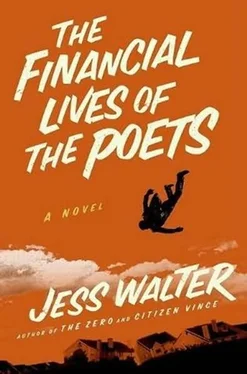No, it was clear. The newspaper was sick. Dying. And when the next round of inevitable layoffs came, there I was, at the top of the to-go list, the company not at all unhappy to lose my top-scale salary and four weeks of vacation, my three-plus benefits package. My demise represented a nice chunk of savings. And when
they cut me a little fourteen-week pity severance check, the sweet Human Resources minx Amber Philips pointed out with no sense of irony that I was “lucky” to get so much severance because they could have only counted my service from the four months after I returned.
“Lucky,” I said.
Now, as I take the elevator up to the fifth floor and that Gitmo of offices, Human Resources, I pray to God or the Pope, or whichever saint is in charge of humiliation avoidance that the elevator doors will NOT open to the third floor, that old cauldron of a newsroom, but of course the Pope-knowing that I haven’t taken the required classes yet-causes the doors to open exactly on the third floor. And, not satisfied with this, the Pope causes to step on my elevator the last person on earth I would want to see, the Idi Amin of journalism, the Pol Pot of my newspaper, he whose name cannot be typed without befouling a keyboard, the very editor who accepted my resignation two years ago and then took me back, only to force me out four months later, the evil M-. With him is one of the young women he likes to hire, unfailingly busty reporters he is tireless in his willingness to…uh, mentor.
“Oh,” says M-as he steps onto the elevator. His back stiffens. He looks like he’s seen a ghost, the ghost of someone he whacked. “Matt. Hello. How are you?”
“Excellent,” I answer. “Much happier, thanks. Taller.”
We ride in silence. M-is an awkward clunk of a man who constantly strokes his pencil-thin chinstrap beard, which due to his substantial girth, is more like a double-chin strap. I suppose it’s unfair, blaming this bloated despot for ruining my newspaper, since every paper is similarly suffering, the big-picture decline of my newspaper no different than the decline of newspapers in most towns. Specifically, the timeline looks like this:
1950s: TV arrives and it turns out that most people prefer having their news delivered by a guy on TV with molded plastic hair, smoking a cigarette.
1960s: Evolution and improved diet cause the first father in history to give up reading the paper on the toilet…much like the first fish that walked on land.
1970s: Literacy and newspapers reach their peak just as, ironically, actual reading begins to decline. (Side note: the guy reading the TV news quits smoking on air.)
1980s: Cable TV arrives and steals ad dollars from newspapers; soon entire channels are devoted to 24 hours-a-day news with three main components: (1) stories about celebrities, (2) police chases filmed from helicopters and (3) angry political hacks yelling at one another.
1990s: The Internet arrives, stealing even more advertising, and compelling the last reader under forty to cancel his daily newspaper subscription so he can devote more time to masturbating to online porn.
2000s: eBay and craigslist combine to kill off classified advertising and car and house listings, which turn out to have been the financial backbone of newspapers. The recession crushes display advertisers, coolly finishing the job.
Present: After a long period of newspaper panic, publishers do increasingly stupid things to drive away what readers they once had, speeding up their impending death, which is now estimated to be somewhere around 2015.
Of course, the specific details vary. At my mid-sized newspaper, the soul-disabled publisher scoured the various newspaper chains until he found the perfect budget-hacking delusional jargon-monkey, a man driven out of every crappy newspaper he ever ruined, a man who-in my humble opinion-is at the very least a narcissist, and at worst, a complete sociopath (thus, his in-house nickname, Idi Amin). Like any tyrant worth his sadism, M-’s first move was to force out any managers who might disagree with him, and his second move-right out of the Khmer Rouge playbook-was to target and demote any intelligent people left who might question his propaganda, until before long, he had systematically dumbed down management to a flock of morons whose only qualification was loyalty. Oddly, M-seemed to have no real interest in the city his newspaper was supposed to cover; his only passion was the business itself, a thing he called newspapering, and he constantly made us all uncomfortable by professing a creepy, nostalgic love for this made-up word, a love he seemed to mainly show by wearing a ’40s-movie fedora and getting weepy whenever he reflected back on the fourteen months he spent as a libelous reporter waterboarding the English language. “The man loves journalism the way pedophiles love children,” we used to say.
Meanwhile, M-continued to promote his sycophants and to build himself the Taj Mahal of offices, even as he oversaw round after round of layoffs. Like some medieval doctor, this self-aggrandizing bully claimed he was saving the paper every time he bled it, and throughout the long decline, continued to waste a reporter’s full salary each year flying to journalism conferences where he could bloviate alongside the other Saddams about the future of newspapers (whose very death they were ensuring). We dreaded whenever M-went to one of these conferences because he invariably came home with a whole new batch of bad ideas , and like a delusional general moving his shrinking forces across fronts that only
he could see, he would announce one day the future of newspapers was an entirely online edition. (Advertisers read this proclamation, shrugged and cancelled their ads in the print edition, leading to yet another round of layoffs.) Then, without ever acknowledging a misstep, M-would proclaim the future of newspapers was putting print reporters on television! (Anyone who has ever seen a newspaper reporter knows how this turned out…more layoffs.) Then the future was putting the newspaper on radio! (“Radio? My God, we’re going backwards in time,” my colleagues said. “What’s next? Cave-painting?”) In the waves of layoffs that accompanied these paroxysmal death-throes, this bearded shit-in-a-suit whacked the newspaper’s most profitable sections and bureaus and its best writers and shooters, all to protect his ring of beholden pets, a phalanx of talent-challenged ass-sniffers and the cadre of bulbous interns that he hired from his Midwest alma mater and its pretentiously named H-School of Journalism (there are two things that should never be named: j-schools and penises), an equally overrated institution that he hoped to eventually return to in some kind of endowed bean bag chair.
But I suppose death comes for tyrants too. Because recently, I’ve heard from my former colleagues that M-is being forced out himself, that the publisher is finally tired of his blustery bristling incompetence, and has given him two months to find another job. Like any delusional dictator looking for asylum, M-is planning to make it look as if he’s fed up with years of laying people off and has decided to fall on his own sword (a weapon profoundly dulled from the heads he’s chopped with it). Then he can go out and seek ingratiating, flattering profiles of himself (One Editor Takes a Stand) in industry publications that should know better. Ah, well. Cheaper than sending out résumés, I suppose.
And what of the ship that this Queeg of journalism has run aground? My old paper, which I still irrationally love, is half the
number of pages it was just a few years ago and one rail narrower. The once plucky staff-my old colleagues and friends-now resembles the nervous crew in one of the Alien movies, their numbers shrinking as they look over their shoulders and wait for one of those mean little pink-slips to burst out of their chests.
Читать дальше










